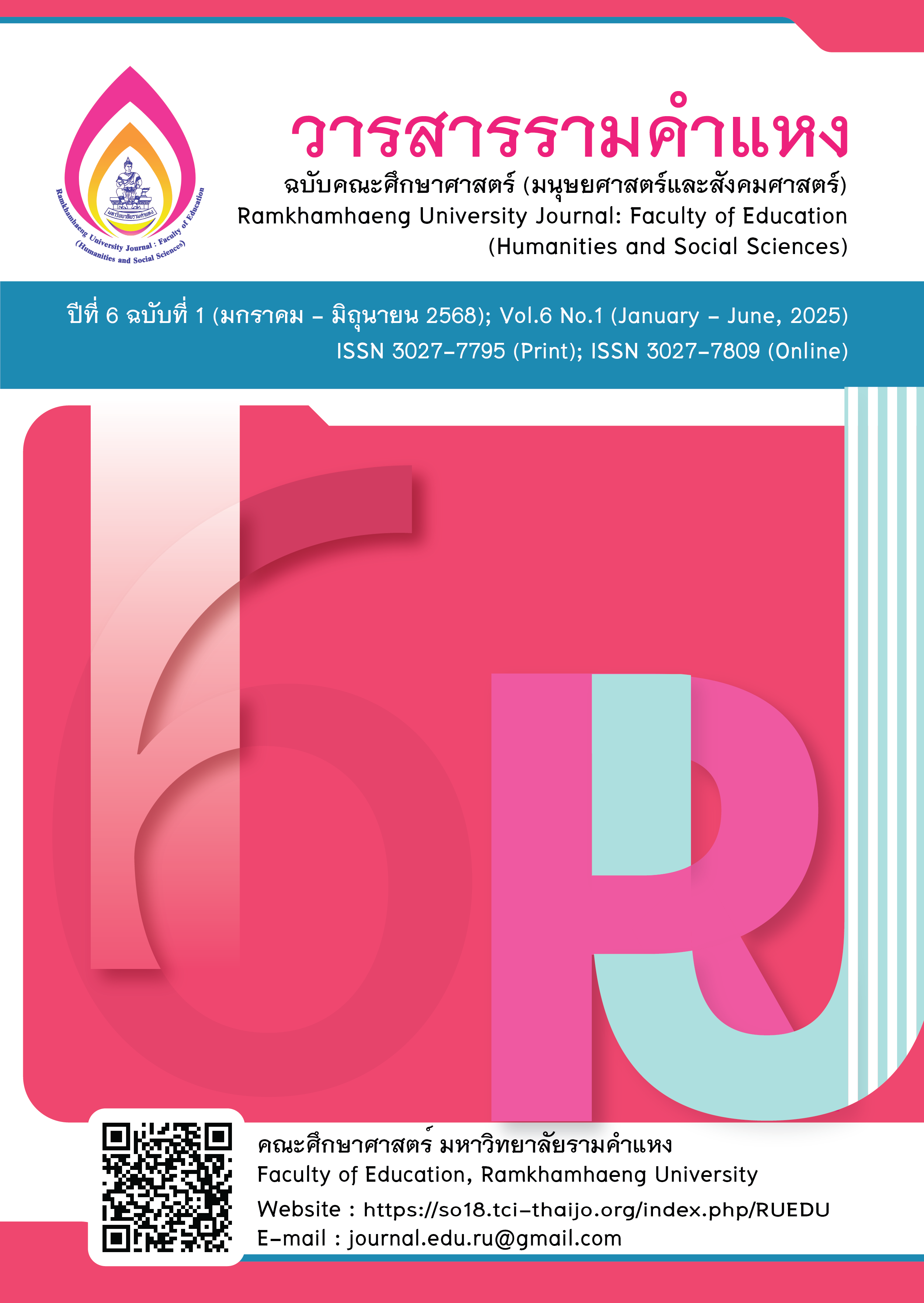การส่งเสริมคำศัพท์ภาษาอังกฤษสำหรับเด็กปฐมวัยชั้นอนุบาล ด้วยกิจกรรมเพลงภาษาอังกฤษ
Main Article Content
บทคัดย่อ
งานวิจัยนี้มีวัตถุประสงค์เพื่อ (1) ศึกษาความสามารถในการจำคำศัพท์ภาษาอังกฤษของเด็กปฐมวัยที่ได้รับ
การจัดกิจกรรมเพลงภาษาอังกฤษ (2) พัฒนากิจกรรมเพลงภาษาอังกฤษให้มีประสิทธิภาพตามเกณฑ์ 80/80 และ
(3) เปรียบเทียบความสามารถในการจำคำศัพท์ภาษาอังกฤษของเด็กปฐมวัยก่อนและหลังการจัดกิจกรรม กลุ่มตัวอย่าง
เป็นเด็กปฐมวัยชายและหญิง อายุระหว่าง 5 - 6 ปี ที่เรียนอยู่ชั้นอนุบาล 3 โรงเรียนบ้านกกค้อกกโพธิ์ อำเภอนากลาง
จังหวัดหนองบัวลำภู จำนวน 22 คน สุ่มกลุ่มตัวอย่างอย่างง่ายด้วยการจับฉลากได้ 1 ห้อง จาก 4 ห้อง เครื่องมือ
ที่ใช้ในการวิจัย คือ แผนการจัดกิจกรรมเพลงภาษาอังกฤษที่มีผลต่อการจำคำศัพท์ภาษาอังกฤษ จำนวน 5 แผน
และแบบทดสอบความสามารถด้านการจำคำศัพท์ภาษาอังกฤษ วิเคราะห์ข้อมูลโดยวิเคราะห์ E1/E2 ค่าเฉลี่ย
ส่วนเบี่ยงเบนมาตรฐาน และ dependent t test ผลการวิจัย พบว่า (1) ความสามารถด้านการจำคำศัพท์ที่ได้รับการจัด
กิจกรรมเพลงภาษาอังกฤษมีคะแนนเฉลี่ยภาพรวม 9.36 (SD = 0.49) กิจกรรมที่มีค่าเฉลี่ยสูงสุด คือ กิจกรรมสัปดาห์
หรรษาครั้งที่ 5 มีค่าเฉลี่ยเป็น 9.95 (SD = 0.21) รองลงมาคือ กิจกรรมเดือนหรรษาครั้งที่ 5 มีค่าเฉลี่ยเป็น 9.90
(SD = 0.29) ส่วนที่มีค่าเฉลี่ยน้อยที่สุด คือ กิจกรรมสัปดาห์หรรษาครั้งที่ 1 มีค่าเฉลี่ยเป็น 8.68 (SD = 0.48)
(2) กิจกรรมเพลงภาษาอังกฤษมีประสิทธิภาพตามเกณฑ์ 77.82/80.30 และ (3) ความสามารถด้านการจำคำศัพท์
ภาษาอังกฤษหลังเรียนสูงกว่าก่อนเรียนอย่างมีนัยสำคัญทางสถิติที่ระดับ 0.05
Downloads
Article Details

อนุญาตภายใต้เงื่อนไข Creative Commons Attribution-NonCommercial-NoDerivatives 4.0 International License.
ผู้ส่งบทความ (และคณะผู้วิจัยทุกคน) ตระหนักและปฎิบัติตามจริยธรรมการวิจัยอย่างเคร่งครัด ทั้งนี้บทความ เนื้อหา ข้อมูล ข้อความ ภาพ ตาราง แผนภาพ แผนผัง หรือข้อคิดเห็นใดๆ ที่ปรากฎในบทความ เป็นความคิดเห็นและความรับผิดชอบของผู้ส่งบทความ กองบรรณาธิการไม่จำเป็นต้องเห็นตามเสมอไป และไม่มีส่วนรับผิดชอบใดๆ โดยถือเป็นความรับผิดของของเจ้าของบทความเพียงผู้เดียว
เอกสารอ้างอิง
Booncherdchoo, S. A., Songsombat, T., & Wongpoodpraw, N. (2021). Evaluation of the learning management curriculum to promote English skills (English Program) at the Demonstration School of Silpakorn University (early childhood and primary). Silpakorn Educational Research Journal, 1 3 (1 ), 60-76.Retrieved from https://so05.tci-thaijo.org/index.php/suedureasearchjournal/article/view/246776/171184(in Thai)
Flower, L., & Hayes, J. R. (1981). A cognitive process theory of writing. College Composition and Communication, 32(4), 365-387.
Inthaprasit, N., & Srabua, A. (2015). Applying English song activities to develop connected speech in English. Rajamangala University of Technology Suvarnabhumi. https://research.rmutsb.ac.th/fullpaper/2558 /2558240240328.pdf (in Thai)
Kasuwan, M., & Chatuphot, M. (2013). Effectiveness of English song activities on vocabulary learning and speaking ability and retention. Journal of Liberal Arts, Prince of Songkla University, 5(2), 18-31. https://so03.tci-thaijo.org/index.php/journal-la/article/view/64228 (in Thai)
Ministry of Education. (2017). Early childhood education curriculum 2017. Kurusapa Radplao Printing. (in Thai)
Piaget, J. (1970). Science of education and the psychology of the child. Orion Press.
Sartsuphap, W. (2020). Guidelines for applying Kodaly approach in the development of singing ability and compose music for preschool children of early childhood education students. Sripatum Chonburi Academic Journal, 17(2), 200-208. https://so05.tci-thaijo.org/index.php/SPUCJ/article/view/248796 /169079 (in Thai)
Thornbury, S. (2002). How to teach vocabulary. Pearson Education. https://scirp.org/reference/referencespapers .aspx?referenceid=203958
Yodsingh, P. (2017). Design and development of learning media in order to educates language skill for young children. [Bachelor thesis, Ubon Ratchathani University]. https://www.ubu.ac.th/web/files_up/ 30f20 19050115052442.pdf (in Thai)


